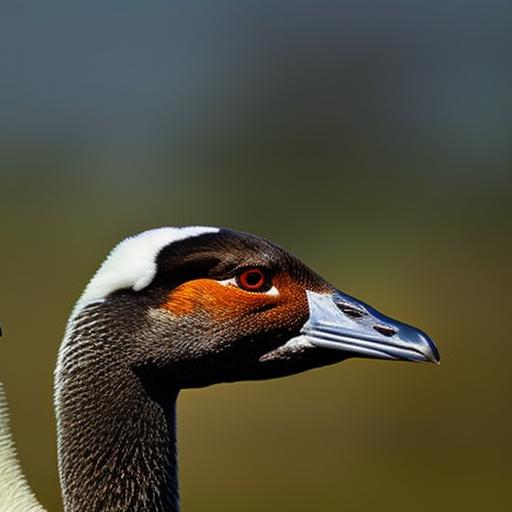Geese are known for their strong and loyal nature, making them a popular choice for those looking to raise friendly and sociable birds. Understanding the temperament of geese is essential for anyone considering adding them to their flock. Geese are highly social animals and thrive in the company of others. They are known to form strong bonds with their human caretakers and can be incredibly affectionate and loyal. However, geese can also be territorial and protective, especially when it comes to their nesting areas and young goslings. It’s important to understand the natural instincts and behaviors of geese in order to create a harmonious and happy environment for them to thrive.
Geese are also known for their intelligence and curiosity. They are quick learners and can be easily trained to follow commands and routines. Geese are also highly vocal animals and will often communicate with each other and their human caretakers through a series of honks and calls. Understanding the vocalizations and body language of geese is crucial for building a strong and trusting relationship with them. By understanding their temperament and behaviors, you can create a positive and enriching environment for your geese to thrive.
Choosing the Right Breed for a Friendly Flock
When it comes to raising a friendly and sociable flock of geese, choosing the right breed is essential. There are several different breeds of geese, each with their own unique temperament and characteristics. Some breeds are known for being more docile and friendly, while others may be more territorial and aggressive. It’s important to research and understand the specific traits of each breed in order to choose the right one for your flock. Some popular breeds known for their friendly temperament include Toulouse, Embden, and Chinese geese. These breeds are known for being gentle, sociable, and easy to handle, making them a great choice for those looking to raise a friendly flock of geese.
When choosing a breed for your flock, it’s also important to consider the climate and environment in which they will be raised. Some breeds are better suited for colder climates, while others may thrive in warmer temperatures. Additionally, consider the size of the breed and the space you have available for your flock. Larger breeds may require more space to roam and graze, while smaller breeds may be better suited for smaller enclosures. By choosing the right breed for your flock, you can ensure a harmonious and happy environment for your geese to thrive.
The Benefits of Raising Docile Geese
Raising docile geese can offer a wide range of benefits for both the geese and their human caretakers. Docile geese are known for their gentle and friendly nature, making them a joy to be around. They are often more sociable and affectionate, forming strong bonds with their human caretakers. This can make for a rewarding and enriching experience for those looking to raise geese as pets or for small-scale farming. Docile geese are also easier to handle and train, making them a great choice for those new to raising geese. Their gentle nature can make them more approachable and less intimidating, especially for children or those with limited experience with geese.
In addition to their friendly temperament, docile geese are also known for their productivity. Many docile breeds of geese are excellent egg layers, providing a valuable source of fresh eggs for their caretakers. They are also efficient grazers and can help to keep grass and weeds in check, making them a valuable addition to a small-scale farm or homestead. Raising docile geese can also have a positive impact on the environment, as they can help to control pests and maintain a healthy balance in the ecosystem. Overall, raising docile geese can offer a wide range of benefits for both the geese and their human caretakers, making them a valuable and rewarding addition to any flock.
Tips for Socializing and Bonding with Your Geese
Socializing and bonding with your geese is essential for building a strong and trusting relationship with them. Geese are highly social animals and thrive in the company of others, including their human caretakers. By taking the time to socialize and bond with your geese, you can create a positive and enriching environment for them to thrive. One of the best ways to socialize with your geese is to spend time with them on a regular basis. This can include feeding them by hand, talking to them, and simply spending time in their presence. By being consistent and patient, you can build a strong bond with your geese and earn their trust.
Another important aspect of socializing and bonding with your geese is to establish yourself as the leader of the flock. Geese are highly social animals and thrive in a structured and organized environment. By establishing yourself as the leader, you can create a sense of security and trust for your geese. This can be achieved through positive reinforcement and consistent training. By setting clear boundaries and expectations, you can create a harmonious and respectful relationship with your geese. Additionally, it’s important to be patient and understanding with your geese, as building a strong bond takes time and effort. By socializing and bonding with your geese, you can create a positive and enriching environment for them to thrive.
Creating a Safe and Comfortable Environment for Friendly Geese
Creating a safe and comfortable environment for your friendly geese is essential for their health and well-being. Geese thrive in a spacious and secure environment that allows them to roam and graze freely. When creating a living space for your geese, it’s important to consider their specific needs and behaviors. Geese are known for their love of water, so providing a pond or shallow pool for them to swim and bathe in is essential. Additionally, geese require access to fresh grass and vegetation for grazing, so providing a large outdoor area for them to roam is important. It’s also important to provide shelter and protection from the elements, as well as predators. This can include a secure coop or shelter for them to rest and roost in, as well as fencing to keep them safe from predators.
In addition to their physical environment, it’s also important to consider the social dynamics of your geese flock. Geese are highly social animals and thrive in the company of others. It’s important to provide ample space for your geese to interact and socialize with each other, as well as with their human caretakers. By creating a safe and comfortable environment for your geese, you can ensure that they are happy and healthy, and that they have the opportunity to thrive.
Training and Handling Friendly Geese
Training and handling friendly geese is essential for building a strong and trusting relationship with them. Geese are highly intelligent animals and can be easily trained to follow commands and routines. By taking the time to train and handle your geese, you can create a positive and enriching environment for them to thrive. One of the best ways to train your geese is through positive reinforcement. This can include using treats and rewards to encourage desired behaviors, such as coming when called or following commands. By being consistent and patient, you can train your geese to respond to your cues and commands, creating a harmonious and respectful relationship.
In addition to training, it’s also important to handle your geese regularly in order to build trust and confidence. By handling your geese from a young age, you can help them become more comfortable and accustomed to human interaction. This can make it easier to care for and manage your geese, as well as to bond with them on a deeper level. When handling your geese, it’s important to be gentle and patient, and to respect their boundaries. By training and handling your geese, you can create a positive and enriching environment for them to thrive.
Common Misconceptions About Geese Temperament
There are several common misconceptions about the temperament of geese that can lead to misunderstandings and misinterpretations of their behavior. One of the most common misconceptions is that geese are inherently aggressive and territorial. While it’s true that geese can be protective of their nesting areas and young goslings, they are not inherently aggressive animals. In fact, geese are known for their gentle and loyal nature, and can be incredibly affectionate and sociable when raised in a positive and enriching environment. By understanding the natural instincts and behaviors of geese, you can create a harmonious and happy environment for them to thrive.
Another common misconception about geese is that they are noisy and disruptive animals. While geese are known for their vocalizations, they are not inherently noisy animals. In fact, geese are highly communicative and will often vocalize to express their needs and emotions. By understanding the vocalizations and body language of geese, you can better interpret their behavior and respond to their needs. By dispelling common misconceptions about geese temperament, you can create a positive and enriching environment for them to thrive.
Integrating Docile Geese into a Mixed Flock
Integrating docile geese into a mixed flock of other birds and animals can be a rewarding and enriching experience. Geese are highly social animals and thrive in the company of others, including other geese, as well as chickens, ducks, and other farm animals. When integrating docile geese into a mixed flock, it’s important to consider the specific needs and behaviors of each species. Geese are known for their protective nature, so it’s important to introduce them to other animals slowly and carefully. By providing ample space and supervision, you can help to ensure a smooth and harmonious integration.
It’s also important to consider the social dynamics of the mixed flock. Geese are known for their strong bonds with their human caretakers, as well as with other geese. By providing ample space for your geese to interact and socialize with other animals, you can create a positive and enriching environment for them to thrive. Additionally, it’s important to provide ample food and resources for all of the animals in the mixed flock, in order to prevent competition and conflict. By integrating docile geese into a mixed flock, you can create a harmonious and happy environment for all of the animals to thrive.
Recognizing Signs of Aggression in Geese and How to Address Them
While geese are known for their gentle and sociable nature, they can also display signs of aggression, especially when it comes to protecting their nesting areas and young goslings. It’s important to recognize the signs of aggression in geese in order to address them and prevent potential conflicts. Some common signs of aggression in geese include hissing, flapping their wings, and charging or biting. If you notice these behaviors in your geese, it’s important to take a step back and assess the situation. It’s important to remain calm and avoid escalating the situation, as this can further agitate the geese.
One of the best ways to address signs of aggression in geese is to provide them with a safe and secure environment in which to nest and raise their young. By providing ample space and protection, you can help to alleviate their natural instincts to protect their nesting areas. Additionally, it’s important to establish yourself as the leader of the flock in order to create a sense of security and trust for your geese. By recognizing signs of aggression in geese and addressing them in a calm and respectful manner, you can create a positive and enriching environment for them to thrive.
Building Trust and Establishing a Strong Relationship with Your Geese
Building trust and establishing a strong relationship with your geese is essential for creating a positive and enriching environment for them to thrive. Geese are highly social animals and thrive in the company of others, including their human caretakers. By taking the time to build trust and establish a strong relationship with your geese, you can create a harmonious and happy environment for them to thrive. One of the best ways to build trust with your geese is to spend time with them on a regular basis. This can include feeding them by hand, talking to them, and simply spending time in their presence. By being consistent and patient, you can build a strong bond with your geese and earn their trust.
It’s also important to establish yourself as the leader of the flock in order to create a sense of security and trust for your geese. By setting clear boundaries and expectations, you can create a harmonious and respectful relationship with your geese. Additionally, it’s important to be patient and understanding with your geese, as building a strong bond takes time and effort. By building trust and establishing a strong relationship with your geese, you can create a positive and enriching environment for them to thrive.
Meet Walter, the feathered-friend fanatic of Florida! Nestled in the sunshine state, Walter struts through life with his feathered companions, clucking his way to happiness. With a coop that’s fancier than a five-star hotel, he’s the Don Juan of the chicken world. When he’s not teaching his hens to do the cha-cha, you’ll find him in a heated debate with his prized rooster, Sir Clucks-a-Lot. Walter’s poultry passion is no yolk; he’s the sunny-side-up guy you never knew you needed in your flock of friends!







